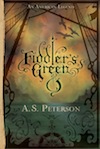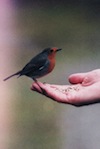My parents raised me for fourteen years. No more, no less. That may seem like an odd thing to say but it’s true. Some kids don’t get that much time. All you have to do is go to the grocery store or a fast food place to find out what I mean. Shifty eyes, mumbled grunts, manners in retreat, unclean hands, inability to count change. I’m grateful for the fourteen good years of proper parenting I had. Then Jack Kerouac took over. He was a lousy parent. As suburban shamans go, you couldn’t do better. Jack Kerouac, writer and former football star, was a game-changer.
 I can still hear the jingling of the bells on the back basement door as we opened it and stepped into the cool, dim interior. The air was sweet with the must and dust of the ages, a fragrance to quicken the pulse of any book-lover, and little elf-lamps of light were clipped to the door frames and adorning the shelves, lending a friendly warmth to the gloom.
I can still hear the jingling of the bells on the back basement door as we opened it and stepped into the cool, dim interior. The air was sweet with the must and dust of the ages, a fragrance to quicken the pulse of any book-lover, and little elf-lamps of light were clipped to the door frames and adorning the shelves, lending a friendly warmth to the gloom. I can still hear the jingling of the bells on the back basement door as we opened it and stepped into the cool, dim interior. The air was sweet with the must and dust of the ages, a fragrance to quicken the pulse of any book-lover, and little elf-lamps of light were clipped to the door frames and adorning the shelves, lending a friendly warmth to the gloom.
I can still hear the jingling of the bells on the back basement door as we opened it and stepped into the cool, dim interior. The air was sweet with the must and dust of the ages, a fragrance to quicken the pulse of any book-lover, and little elf-lamps of light were clipped to the door frames and adorning the shelves, lending a friendly warmth to the gloom.

























